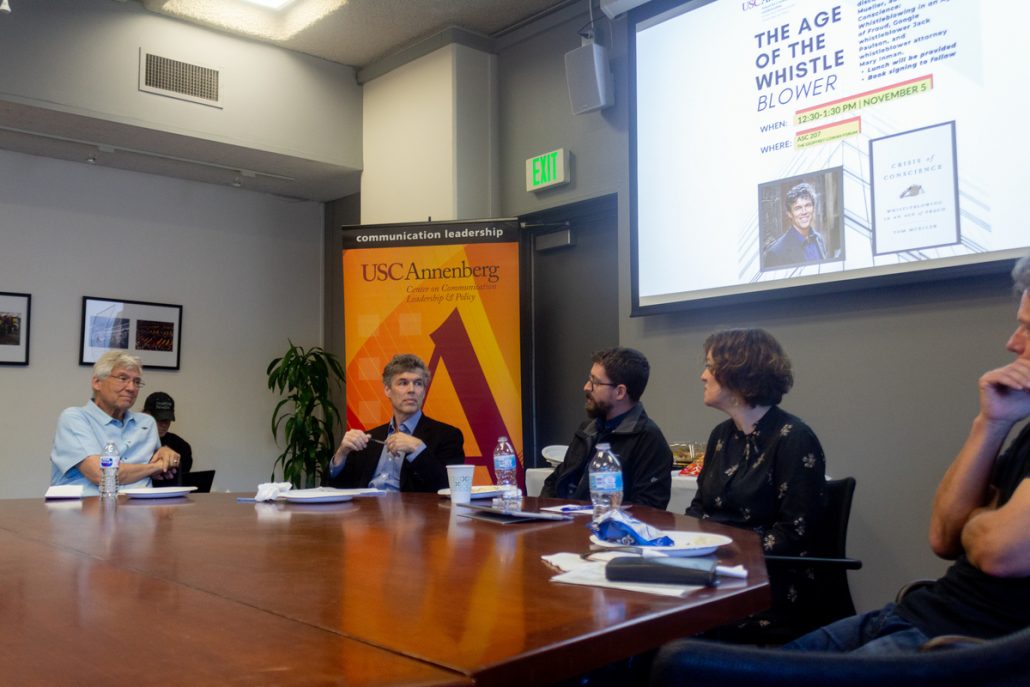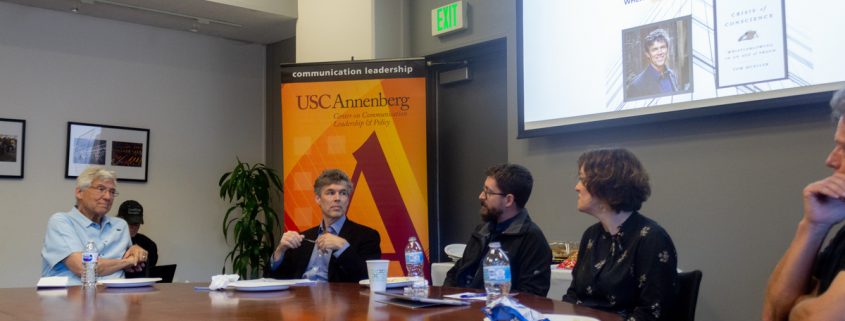Panelists discuss role of whistleblowers in the US

(Ashley Lyu | Daily Trojan)
Panelists spoke about whistleblowing within American companies and political institutions at a Annenberg Center on Communication Leadership & Policy event Tuesday.
The panel featured Tom Mueller, author of “Crisis of Conscience;” Jack Poulson, a Google whistleblower and former Stanford University assistant professor; Mary Inman, a whistleblower attorney; and Gavin Hood, a South African filmmaker and director of “Official Secrets,” which details the true story of a British whistleblower. Geoffrey Cowan, director of the Annenberg Center on Communication Leadership and Policy, moderated the discussion.
Mueller said those who expose company secrets are often perceived in a negative light and explained the reasoning behind their unfavorable image.
“The individual becomes the traitor, the snitch, the rat even though we as a society, our founding documents celebrate truth and justice,” Mueller said. “When someone turns on you, it can be very personal. Fundamentally, truth and justice are against loyalty and obedience in every one of these categories.”
Poulson discussed his experience at Google, where he quit his job after learning the company would launch a censored version of its search engine in China. Poulson then wrote an editorial in The New York Times, which publicized the issue.
“I saw a blacklist that literally contained the term ‘human rights’ on it, which was more than a little upsetting,” Poulson said.
As a seasoned attorney who specializes in representing whistleblowers and partner at Constantine Cannon LLP, Inman pointed to the relationship between lawyers, journalists and whistleblowers. Inman traced the origins of whistleblowers back to the False Claims Act, a law enacted in 1863 — and later amended in 1986 — that imposed liability on companies that attempted to defraud the government.
“From 1986 to present, there are $60 billion in return to the U.S. Treasury as a result of cases by whistleblowers. Why is that?” Inman said. “It’s intuitive to everyone in this room who is a journalist, which is, whistleblowers, like your sources, know where the bodies are buried. There’s no substitute for a well-placed insider.”
Inspired by the same reasons as mentioned by the others, Hood, who had not planned on speaking on the panel, shared his experience working on his film. He detailed the process he took researching whistleblowers and interviewing whistleblower Katharine Gun regarding her involvement in exposing illegal activities of the United States leading up to the Iraq War.
Hood said he was fascinated with Gun’s story after doing some initial research but was skeptical when it came to making the film.
“My first reaction was, ‘Well, you know, she’s a spy, she must have been in a dirty world, what did she think she was getting into?’” he said.
However, upon meeting Gun in person, Hood said he understood the significance of the whistleblower and the bravery it takes to expose hidden truths. He said whistleblowers play an important role in democracy.
Josh An, a junior majoring in communication, said he gained a new perspective on whistleblowers and the challenges they face.
“I didn’t know how tough it was for whistleblowers to actually come out,” An said. “I think on the outside it seems easy like, ‘Oh, just expose something that you see that’s bad,’ but in reality, there’s so much stacked up against them, and I think that was really surprising.”

